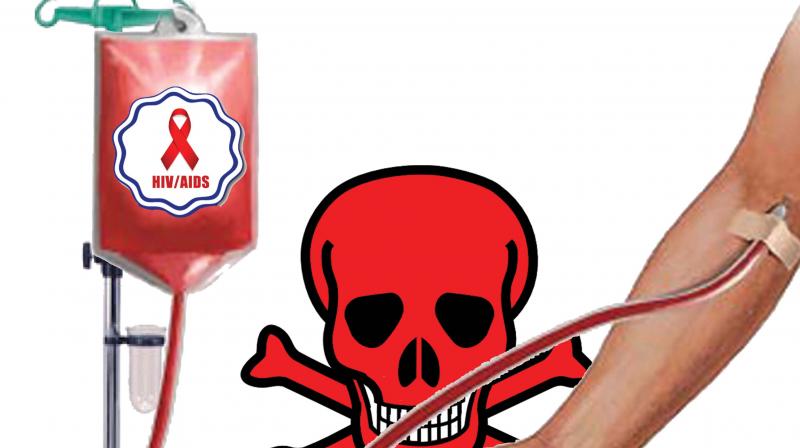Blood bonds gone wrong
An average 1.5 lakh units blood is collected across state daily.

THIRUVANANTHAPURAM: The shocking incident of a nine-year-old girl contracting HIV infection through blood transfusion allegedly at the Regional Cancer Centre (RCC) here has thrown up disturbing questions about the screening of blood in hospitals across the state. While the expert panel headed by Joint DME and the police have initiated separate probe into the matter, many believe its time to revamp the entire blood bank system. Experts say blood donation during ‘window period ' is one of the main sources of transfusion linked to HIV infection. “The time frame between when one is exposed to HIV to the time he tests positive for HIV antibodies can be up to 3 to 6 months. One may need 2 to 8 weeks from the time of possible exposure to get an accurate test result. It takes this long for the immune system to develop enough HIV antibodies to be detectable,’’ said a doctor.
At the moment all blood banks have facilities for 4th generation ELISA tests or combined anti body/antigent (Ag/Ab) tests which is mandatory. The Elisa test detects HIV infection in six weeks. Even though a proposal was submitted to the government to introduce centralised Nucleic Acid Testing (NAT) Lab which can detect HIV infection within six days, there’s been no action on it yet. NAT is the preferred choice in the US, Asia and most European countries because it provides the highest sensitivity, best value, highest throughput with good service backing. Neighbouring Karnataka has already introduced the NAT facility which is working successfully. Since the cost of test is on the higher side, government subsidy is required to provide the facility in public health care institutions. Some of the private hospitals are charging Rs 1,000 for the test.
“Once the NAT facility is set up, blood collected from across the state can be transported to a single Centre and the results would be available within 24 hours,” said Dr N Vijayakumar, medical officer in charge, regional blood transfusion centre Aluva and also technical expert NACO and Assessor NABH, who drafted the proposal. On an average 1.5 lakh units of blood is collected across the state daily. To prevent the transfusion related infection, the state needs successful donor recruitment, retention plan and an effective deferral strategy to exclude donors with risk behaviour. As per norms all blood donations should be screened for evidence of infection prior to the release of blood for clinical use.
The Drugs Control Department which is responsible for monitoring the functioning of blood banks has just five regional level inspectors for carrying out inspections in blood banks across the state. They are responsible for monitoring 172 licensed blood banks including 32 in the government sector, 7 in the cooperative sector and the remaining in the private sector. Besides, they are also expected to take care of 35 blood component separation units in the private sector and nine in the government sector. Though NACO had directed the states to convert the blood banks having collection of less than 2000 units annually into blood storage units, the recommendation is yet to be implemented in Kerala. About 60 per cent of the blood banks in the state have annual collection of less than 2000 units. Those with over 2000 units were to be made blood component separation units.
Several questions are being raised about the safety of blood collected and transfused through many of these establishments. Four years ago a similar case was reported in the state when an eight year old girl contracted HIV infection through blood transfusion from a government hospital. At that time also the question of blood bank monitoring was discussed widely. The shortage of drug inspectors has also hit inspection of blood banks in the state. “We conduct regular inspection at the blood banks. The regional drugs inspectors have been assigned the task for different districts,” said State Drugs Controller Ravi S Menon.
Considering the increasing number of collections in the state, the strength of drug inspectors need to be more than doubled. Notices slapped by the department on blood banks pointing out their deficiency, are often ignored by the health department. Over the past four years scores of notices have been issued to blood banks but there has been no serious attempt to rectify the deficiencies. This situation exists at a time when the blood banks, for checking potential transfusion of transmissible infections, need to strictly follow the guidelines issued by central health authorities. As per NACO norms all blood donations should be screened for evidence of infection prior to the release of blood for clinical use. Donors who give history suggestive of HIV infection such as; swollen glands, persistent cough, unexplained weight loss, night sweat/fever, skin rashes, skin infections and prolonged diarrhoea should be deferred permanently. Private interview of each donor is essential to assess the risk of HIV.

